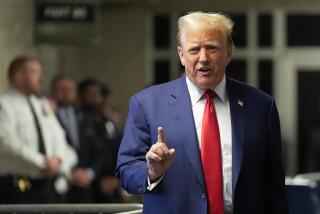Bush Facing Summit Test of Leadership : Diplomacy: He must contend with Group of 7 on faltering Soviet economy as well as trade liberalization.
President Bush faces a major test of his leadership when the annual seven-nation economic summit convenes in London on Monday, despite the commanding position that he achieved as head of the alliance during the Persian Gulf crisis.
Not only must Bush contend with lingering differences within the alliance over how to deal with the alarming deterioration of the Soviet economy, but the seven--the leaders of the United States, Germany, Japan, Britain, France, Italy and Canada--remain stubbornly divided over global trade-liberalization talks considered critical to the health of the world economy.
With Soviet leader Mikhail S. Gorbachev present to plead his case as the summit ends, the questions of Soviet aid and economic and political reforms in that country are likely to dominate the summit and divert its participants at a time when the traditional economic agenda is more critical than it has been in years.
Moreover, the Persian Gulf continues to dog the allies as a distracting--and potentially divisive--issue.
With Iraqi President Saddam Hussein thwarting efforts by the United Nations to examine suspected nuclear weapons material and facilities in Iraq, Bush has raised the possibility of again using force against the Baghdad regime.
The President contends that the U.N. Security Council has given him full authority to take such action, but more talk of renewed military action in the Gulf is likely to send shudders through some allied governments, and Bush will be under pressure to handle the issue gently.
At a press conference last Wednesday, Bush said he is already consulting with allied leaders on the problem, adding: “I am anticipating a unanimous view that we’ve got to keep our eyes wide open and not be lulled by some very belated offering from Saddam Hussein that he is now willing to do that which he . . . should have done a long time ago.”
Potentially far more important than Iraq in the long run, one of the President’s chief economic goals in London will be winning a commitment from the four European summit countries--Britain, France, Italy and Germany--to revive and conclude the crucial global trade talks, which aim to lower barriers to international commerce.
At last year’s economic summit in Houston, the member nations declared the trade talks to be their No. 1 economic priority and vowed to conclude them by the end of 1990.
However, when the 108 countries participating in the talks met last December in what was to be their final bargaining session, the negotiations collapsed--primarily over Europe’s refusal to cut its subsidies to farmers.
Differences over the issue of how to lower agricultural trade barriers remain as deep as ever. Officials believe no breakthrough is likely until the Europeans hammer out their own internal reforms on agriculture later this summer. Still, the United States and Canada hope to prod the seven leaders into stepping up the political pressure for the talks by issuing a strongly worded commitment to expedite the negotiations.
“We’re all haunted by the memories of Houston,” says Derek Burney, Canada’s ambassador to the United States and Prime Minister Brian Mulroney’s representative in the summit planning process. “We will try to make sure the words are more meaningful, more emphatic and hopefully more credible in London.”
Not only are Washington’s economic goals difficult to reach, but if experience is any guide, Bush will be tempted to concentrate his efforts on political issues--such as the West’s strategy toward Moscow--rather than on the tough economic issues.
Some economists say this would be a mistake.
“One of the most important things the West can do at this point is to make sure the global economy, the global trading system, the global financial system is healthy,” says Robert D. Hormats, who was the Reagan Administration’s chief staff member in preparing for several summits and who now is vice chairman of Goldman Sachs International Corp.
A healthy global economy, Hormats adds, is far more important to the Soviet Union and Eastern Europe “than any amount of assistance the West will be able to provide.”
Nevertheless, political problems have had a way of overshadowing economic summits in recent years, and with all the political changes sweeping Eastern Europe and the Soviet Union, that is likely to be true of this year’s summit.
The summit participants also will be struggling with the question of how best to help Eastern Europe in its transition to capitalism, which is proving to be even more difficult than had been feared. In fact, both U.S. and Canadian officials have said the issue is so important that they hope Gorbachev’s presence and the question of Soviet aid do not distract the seven leaders from dealing with it.
“Western Europe would just like to go ahead and deal with that issue itself and have the Americans stay out of it, because we’d just raise problems,” says Barry Bosworth, a Brookings Institution economist who was an economic policy-maker in the Carter Administration. “Every time they try to develop an aid program, then the Americans raise objections.”
The United States also will be pressing Japan and Germany to cut their interest rates, but analysts expect both those countries to rebuff the Bush Administration’s efforts, as they did in two previous meetings of finance ministers earlier this year.
Once again, environmental problems are expected to be a divisive issue among the summit participants, with the United States coming under pressure from other nations to do more to help deal with the threat of global warming.
The United States is the only summit country that has not set targets for reducing carbon-dioxide emissions, considered the chief cause of global warming. In a speech earlier this month, British Prime Minister John Major noted that the United States produces almost twice as much carbon dioxide as the entire 12-nation European Community. “The world looks to them for decisive leadership on this issue, as on others,” Major said.
A coalition of environmental groups from all of the countries, coordinated by the Sierra Club International Program, is calling on the summit countries to pledge to halt all foreign aid that might abet the destruction of primary tropical forests. Despite a summit communique last year expressing strong concern over the rapid loss of tropical forests, the environmental groups said, the destruction of forests continues unabated.
Although the United States is committed to the policy of preserving tropical forests, the groups added, “it has little meaning unless the rest of the leading industrialized nations also agree to stop the destruction of these vital biological and cultural resources.”
The London meeting this year marks the first time that the new, unified Germany has participated in a summit. It also marks the first time that Gorbachev has been invited to meet with the summit leaders, although he was an unseen but influential factor at the last two summits. At both Houston last year and Paris in 1989, much of the summit talk revolved around communications with the Soviet leader.
On the question of aid to the deteriorating Soviet economy, the United States has repeatedly made clear that it would oppose any direct financial support but that it would approve an offer to the Soviet Union to become an associate member of the World Bank and International Monetary Fund. That would give the Soviets access to the expertise--but not the money--of those institutions.
Less than two months ago, Gorbachev suggested that the overhaul of the Soviet economy is as vital a task as the Gulf War, which cost roughly $100 billion. But for both political and economic reasons, Bush and other allied leaders have strongly rejected the idea of providing such massive aid.
The Soviet leader, apparently having gotten the message, recently said that he will be seeking Western investments, rather than direct financial aid, while he is at the summit. He also said he will offer a specific reform plan centered on basic Western concerns such as demilitarizing the Soviet economy and making the ruble convertible on the open market with other currencies.
Although Gorbachev is not expecting much in the way of immediate financial assistance, he apparently is looking for a commitment that if he does undertake the necessary reforms, the West will then come to his aid.
“His motives are political,” says Michael Mandelbaum, director of the Council on Foreign Relations’ Project on East-West Relations, arguing that Gorbachev is under siege on three fronts--from his collapsing economy, from the rebellious republics and from his own party’s hard-liners on the right.
“His strategy, I think, in these three areas . . . is to try to enlist the West on his side,” Mandelbaum says. “He believes that he can straighten himself on all three fronts if he can present himself as the man who can deliver the West to the Soviet Union. He is going to ask, in one way or another, for a commitment from the West.”
Secretary of State James A. Baker III has indicated that the allies may offer the Soviets technical assistance in such areas as helping them to produce their own oil and distribute their food.
The position of the industrial powers is that they are in no shape to give much more themselves. The economies of three of the summit nations--the United States, Britain and Canada--are in a recession and those of two others--Italy and France--are on the brink of a slump. Only the economies of Japan and Germany are showing growth.
Moreover, the Bush Administration believes that additional assistance to the Soviet Union would be wasted until the Soviets undertake more serious and painful reforms.
In fact, Baker said, although the Soviet economy continues to deteriorate and the United States understands the gravity of the situation, Moscow still must do much more in the way of economic reforms. “Their choices are tough ones . . . but it is our view that equivocation will really only lead to tougher choices down the road.”
No open disagreement is likely on this point in London, but some of the allies--particularly Germany--are inclined to be more forthcoming on immediate help for Moscow than is Bush.
Although Canada’s Mulroney and the four European leaders favor raising the limit on lending to the Soviet Union by the European Bank for Reconstruction and Development, the United States and Japan oppose any such move.
At a press briefing here on the summit, Canada’s Burney contended that this means the United States and Japan are “basically isolated on this issue.” But he also noted pointedly: “It’s a big group.”
A Canadian reporter, referring to what he called Bush’s “tough saber-rattling about Iraq,” asked Burney whether Canada would try to temper the President’s rhetoric on Iraq at the summit.
“Oh, we’re always in the tempering business,” the ambassador replied. “We don’t have too many sabers to rattle, after all.”
More to Read
Get the L.A. Times Politics newsletter
Deeply reported insights into legislation, politics and policy from Sacramento, Washington and beyond. In your inbox three times per week.
You may occasionally receive promotional content from the Los Angeles Times.






